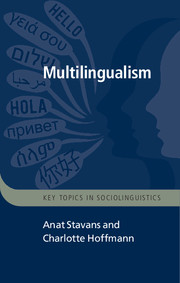Book contents
- Frontmatter
- Dedication
- Contents
- List of Figures and maps
- List of Tables
- Acknowledgements
- Introduction
- Part I Global and societal issues in multilingualism and trilingualism
- Part II Construing individual multilingualism
- 5 Individual multilingualism
- 6 Multilingual language competence and use
- 7 Accommodating multilingualism
- 8 Multilingual education and multilingual literacies
- Glossary
- References
- Author index
- Places and languages index
- Subject index
5 - Individual multilingualism
Published online by Cambridge University Press: 05 February 2015
- Frontmatter
- Dedication
- Contents
- List of Figures and maps
- List of Tables
- Acknowledgements
- Introduction
- Part I Global and societal issues in multilingualism and trilingualism
- Part II Construing individual multilingualism
- 5 Individual multilingualism
- 6 Multilingual language competence and use
- 7 Accommodating multilingualism
- 8 Multilingual education and multilingual literacies
- Glossary
- References
- Author index
- Places and languages index
- Subject index
Summary
Those who know nothing of foreign languages know nothing of their own.
Johann Wolfgang von GoetheIntroduction
Language contact, as we have seen, is brought about in many different ways. Depending on prevailing circumstances, societies and their individual members are affected differently in terms of whether they become users of several languages or not. In theory, it is possible for citizens of multilingual states to remain largely monolingual, especially if the country has adopted the territoriality principle and there is a fair degree of equality between the languages involved, or the different language groups are isolated from each other without much need for communication between them, or the population is too poor to participate fully in the country’s social and economic life.
There is no inherent correlation between societal and individual multilingualism. But in reality, in a multilingual sociopolitical context the likelihood that more people have contact with several languages is greater, simply because of the increased opportunities for interaction. The resulting multilingual language competence may, however, be of a kind restricted to only a limited range of functions and competencies, whereas people who live in monolingual countries may achieve a wider range of knowledge of several languages by, for instance, having been schooled within a multilingual education programme. There are, on the other hand, also societies with a rigid social stratification that allows only limited contact between the constituent social groups, such as the caste system in Indian Hindu society, where very marked variation has developed even within language. Ultimately, the occurrence of multilingualism on a personal level and the degree of language proficiency achieved depend on personal circumstances, patterns of social interaction, mobility (both social and geographical) and motivation.
- Type
- Chapter
- Information
- Multilingualism , pp. 135 - 155Publisher: Cambridge University PressPrint publication year: 2015



